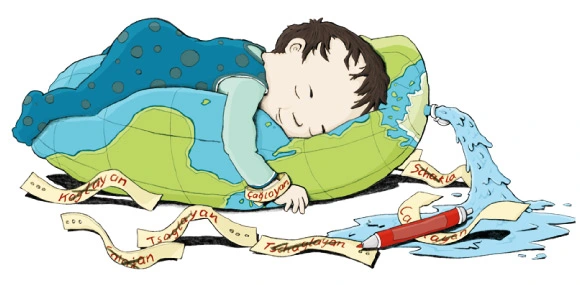Çaǧlayan, my little waterfall
Can names block an international career?
Friends of mine recently had their third child – a boy named Çaǧlayan. Nice. It means little waterfall. It has a cedilla under the C and a hachek over the G – he’ll have to spell it and explain it a little when he's older.
"It's all Ahmet's fault," says his mother, before I've even managed to close the door behind me. Ahmet is her husband, who unfortunately has just gone for a walk with the little one in the pram, so I'm left all alone with the exhausted mother. I hang up my coat, and as I turn back to her I notice that she's crying. "He can forget an international career. He'll have to change his name," she says, pushing a stack of cards into my hand.
"I had a Chinese friend at uni, she called herself Rainbow because nobody could say her Chinese name," I say. Maybe that would comfort her. She wants to know what the woman's real name was, but I can't remember. "See, you can't even remember a short Chinese name," she wailed. I don't know how she came to the conclusion that the name was short, it may have been long and complicated. I simply called the woman Rainbow like everyone else.
"Is my son supposed to go around calling himself Little Waterfall?" She was acting as if I’d had my heart set on Çaǧlayan. "Nobody will ever be able to spell it right, let alone pronounce it correctly. A few people might know that you pronounce the Ç as "ch", but who knows that the ǧ is silent? They'll call him Chaglayan, or Tsaglayan, or Kaglayan. Look, even in the printing shop they screwed it up." She pointed to the cards in my hand that I've already forgotten about. On the front of the folded card there is a photo of her two older sons and the baby. The elder sons are sitting next to one another on their parents' bed with the newborn lying across their legs. One of the brothers got the top half of the baby; the other one got the bottom. You can see from the boys' faces that they argued about who was allowed to hold which half, but they managed a strained smile for the photo. 3.5 kg, 56 cm. Then I see what she means. The cedilla underneath the C is there, but the hachek over the G was originally missing. Someone had added it on later with a felt-tip pen.
"I got my way with the older ones," she said. Fortunately she wasn't crying any more. "Ali and Burak are names everyone can pronounce, everyone can write them and they can be typed on a computer keyboard with Latin letters. No umlaut, no special characters, nothing." Nobody would ask if Ali was a boy or a girl either. I ask why Ahmet was so set on this name. Was he thinking of someone in particular? "Not at all, everyone in our family is called Ahmet or Mehmet. There's never been a Çaǧlayan. I bet not even my mother will spell it correctly." "Now you're exaggerating." "I shouldn't have let myself get soft." "Please don't cry again." "Ahmet said that in his whole life he had never got a letter in which his name was spelt correctly. His name is even wrong on his pay slip. He showed me the letters – from the bank, from his gym, his dental bill. It says 'Achmed', 'Ahmed', 'Achmett' or 'Achmat'. He said he wanted the name he liked because it would be spelt wrong anyway. Then I felt sorry for him, my Ahmet."
Dilek Güngör is a journalist and author. Her column "Weltstadt" appears weekly in the Berliner Zeitung.
